Beneficial Effects on Energy, Atherosclerosis and Aging
By Ward Dean, MD and Jim English
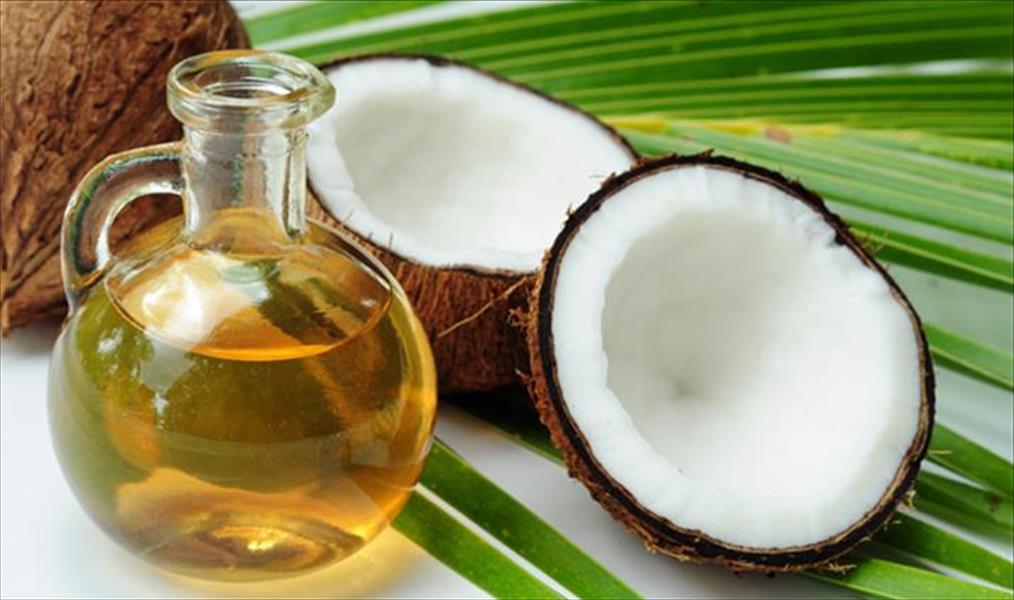 Medium Chain Triglycerides (MCTs) are a unique form of dietary fat that impart a wide range of positive health benefits. Nevertheless, the potential anti-aging properties of MCTs have been largely unrecognized by many life extension enthusiasts. Dietary fats are molecules composed of individual carbon atoms linked into chains ranging from 2 to 22 carbon atoms in length. Long Chain Fatty acids (LCTs) ranging from 12 to 18 carbons long are the predominant form of fat in the American diet. MCTs, by contrast, are composed of only 6 to 10 carbon links. Because of their shorter chain length, MCTs have a number of unique properties which give them advantages over the more common LCTs.
Medium Chain Triglycerides (MCTs) are a unique form of dietary fat that impart a wide range of positive health benefits. Nevertheless, the potential anti-aging properties of MCTs have been largely unrecognized by many life extension enthusiasts. Dietary fats are molecules composed of individual carbon atoms linked into chains ranging from 2 to 22 carbon atoms in length. Long Chain Fatty acids (LCTs) ranging from 12 to 18 carbons long are the predominant form of fat in the American diet. MCTs, by contrast, are composed of only 6 to 10 carbon links. Because of their shorter chain length, MCTs have a number of unique properties which give them advantages over the more common LCTs.
Until the early 1980s, MCTs were predominantly available only as a constituent of butter, coconut oil, and other natural sources. However, Dr. Vigen K. Babayan of the Nutrition Laboratory, Harvard University, developed a process to produce them in large quantities, to be used primarily for therapeutic uses in a number of conditions. (1)
 MCTs, Energy and Exercise
MCTs, Energy and Exercise
MCTs provide about ten percent fewer calories than LCTs – 8.3 calories per gram for MCTs versus 9 calories per gram for LCTs. But this is just one of the unique advantages of MCTs. (2) More importantly, reduced chain length also means that MCTs are more rapidly absorbed by the body and more quickly metabolized (burned) as fuel (Fig. 1). The result of this accelerated metabolic conversion is that instead of being stored as fat, the calories contained in MCTs are very efficiently converted into fuel for immediate use by organs and muscles.
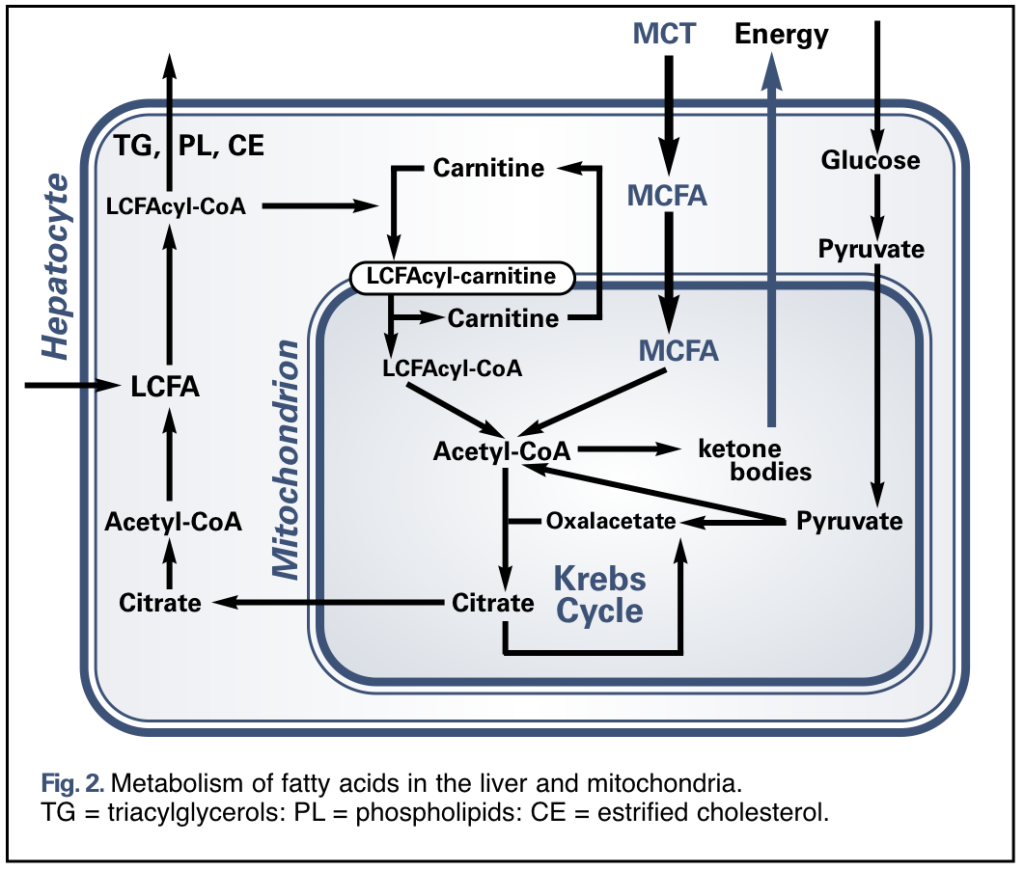 The energy-enhancing properties of MCTs are attributed to the fact that they cross the double mitochondrial membrane very rapidly, and do not require the presence of carnitine, as do LCTs (Fig. 2). The result is an excess of acetyl-coA, which then follows various metabolic pathways, both in the mitochondria (Krebs Cycle) and in the cytosol, resulting in the production of ketones. Scientists attribute the increased energy from consumption of MCTs to the rapid formation of ketone bodies. MCTs are thus a good choice for anyone who has increased energy needs, as following major surgery, during normal or stunted growth, to enhance athletic performance, and to counteract the decreased energy production that results from aging.
The energy-enhancing properties of MCTs are attributed to the fact that they cross the double mitochondrial membrane very rapidly, and do not require the presence of carnitine, as do LCTs (Fig. 2). The result is an excess of acetyl-coA, which then follows various metabolic pathways, both in the mitochondria (Krebs Cycle) and in the cytosol, resulting in the production of ketones. Scientists attribute the increased energy from consumption of MCTs to the rapid formation of ketone bodies. MCTs are thus a good choice for anyone who has increased energy needs, as following major surgery, during normal or stunted growth, to enhance athletic performance, and to counteract the decreased energy production that results from aging.
In recent years MCTs have gained in popularity with athletes seeking to increase energy levels and enhance endurance during high-intensity exercise, as well as serving as an alternative energy source for athletes on high-protein, low-carbohydrate diets. Researchers have previously shown that MCTs can increase physical endurance in animal studies. In swimming capacity tests, mice fed a diet containing MCTs outperformed mice fed a diet containing LCTs. (3) The researchers noted that the muscles of mice fed the MCTs produced higher levels of key metabolic enzymes (3-oxo acid CoA-transferase, citrate synthase and malate dehydrogenase) involved in the Krebs cycle (tricarboxylic acid cycle), the body’s primary energy production mechanism. MCT-fed mice also burned fat at a higher rate to enhance cellular energy production.
MCTs and Weight Control
In addition to their lower caloric content than LCTs, MCTs are not stored in fat deposits in the body as much as LCTs. (2) Furthermore, MCTs have been shown to enhance thermogenesis (i.e., fat burning). (4) So MCTs seem to offer a triple approach to weight loss – they (1) have a lower calorie content than other fats, (2) are minimally stored as fat, and (3) contribute to enhanced metabolism to burn even more calories. This third property may be due to the fact that MCTs behave metabolically in some fashion similar to carbohydrates, as well as their promoting the development of ketones, as mentioned above. (5) Ketone production is a cornerstone of the Atkins Diet, and MCTs may enable those following the Atkins’ program to more rapidly obtain benefits and more easily adhere to the program. Ketones are also one of the two substances which the brain can utilize for energy (glucose, being the other). Dr. Hans Kaunitz speculated that for this reason, MCTs might be advantageous for the aging brain. (6)
Kaunitz and colleagues performed a study on rats, to compare the effects of diets in which the fat was provided by MCTs or lard. The MCT-fed rats lost significant weight, although their calorie consumption was the same as the lard-fed rats. In addition, Kaunitz described the MCT-fed rats as having “an excellent survival rate.” In another study, researchers observed decreased weight gains, reduced fat content, and unchanged whole-body protein content in MCT-fed animals compared to control animals fed LCTs. In a third study, fat deposits in rats fed diets high in MCTs were 23 percent less than in LCT-fed rats.
Animal results have been supported by human trials. In one study researchers fed six lean and six obese young males meals containing either long-chain triglycerides (LCTs) or MCTs plus LCTs. In both the lean and obese individuals, post-meal thermogenesis (fat burning) was enhanced after consuming meals containing MCTs. 7In another study involving a group of obese women on a restricted diet researchers noted that insulin profiles improved when MCTs comprised 24 percent of total consumed calories. (8)
Calorie-restricted diets are often associated with marked declines in energy. A number of studies support the benefits of using MCTs in weight loss programs to boost energy levels and increase fatty acid metabolism to aid in reducing fat deposits. In one study when researchers in Czechoslovakia treated 60 obese patients with MCT oil they concluded that MCTs offered a number of benefits, stating, “Administration of… medium-chain fatty acids can…improve the long-term success of diet therapy of obese patients.” (9)
Appetite Control
MCTs have been shown to suppress appetite, an ability of obvious benefit for those attempting to lower their intake of total calories. In one 14-day study, six healthy male volunteers were allowed unlimited access to one of three diets: a low MCT diet, a medium MCT diet, and a high MCT diet. Caloric consumption was significantly lower on the high MCT diet. The researchers noted that substituting MCTs for other fats in a high-fat diet “can limit the excess energy intakes and weight gain produced by high-fat, energy-dense diets.” (10)
 MCTs and Atherosclerosis
MCTs and Atherosclerosis
MCTs have a number of properties that may be beneficial in preventing atherosclerosis. Among these are that MCTs have anti-coagulation effects, and have been shown to lower serum cholesterol in rats 11 and calves (Fig. 3). (12) In addition, MCTs reduce levels of cholesterol in the liver and other tissues. (5,13) MCTs have also been reported to act as antioxidants and reduce tissue requirements for Vitamin E. (6)
MCTs have a slight hypoglycemic (blood glucose-lowering) effect, and thus may be useful for diabetics, or anyone with a tendency for pre-diabetes (which includes just about everyone over 35). It may be the combination of the glucose and lipid-lowering effects of MCTs that resulted in Kaunitz’ report that “the life span [of experimental animals] is longer when the diet is richer in MCTs than LCTs.”
Finally, another testimony to the benefit of MCTs in preventing atherosclerosis and cardiovascular disease is the country of Sri Lanka. In the 1978 Demographic Yearbook of the United Nations, the causes of death in many countries were reported. Sri Lanka reported a death rate due to ischemic heart disease of 1 per 1,000,000. The figures for most countries varied from 38.4 to 187.7. It is significant that the predominant dietary fat in Sri Lanka is coconut oil, which contains over 50 percent MCTs.
MCTs and Immune Enhancement
To evaluate the immune-normalizing properties of MCTs, Kaunitz and colleagues injected rats with rabbit immune serum, known to cause severe autoimmune kidney disease in the rats. They then administered MCT in the diet, and noted that the pathological changes in the kidneys were much reduced in the MCT-treated group. Kaunitz speculated that MCTs could thus have a positive effect “on autoimmune reactions characteristic of the aging process.”
MCTs and Medicine
MCTs have proven useful in treating a number of medical disorders that involve impaired or damaged lipid (fat) metabolism. These include: obstructive jaundice, biliary cirrhosis, pancreatitis, cystic fibrosis, celiac disease, Whipple’s disease, Crohn’s disease, regional enteritis, and malabsorption in neonates. MCT has been reported to be useful for feeding of newborn infants, to both assist their initial growth and to contribute to their physiological development. The absorption of calcium and magnesium appears to be enhanced when the diet contains MCTs, particularly in infants, and the absorption of amino acids also appears to be improved. Thus, MCTs can be a useful addition to the diet of those suffering from any form of malnutrition or tissue wasting. In this regard, MCTs are often added to parenteral formulas for intravenous feeding following surgery or during recovery from severe injuries, burns and infections.
Conclusion
The major adverse effect that is noted by beginning users of MCTs is nausea and gastric discomfort. This can be minimized or eliminated by starting with very small doses (i.e., about 1/4 teaspoon several times daily), and increasing the dose as tolerated. Before long, MCT can be taken by the tablespoonful. MCT oil can be used as a salad dressing, and as a cooking oil. However, MCT should not be heated to temperatures above 150-160 degrees C, because it will oxidize and breakdown, adversely affecting the taste. With those few caveats, MCTs are an especially beneficial supplement for fueling physical exertion, given their high energy density content, rapid rate of absorption and quick metabolic conversion into cellular energy. Additionally MCTs can be quickly mobilized in the post-exercise recovery phase to rebuild muscles and prevent the breakdown of proteins (catabolism) that can occur when the body is putting a maximum demand on the body’s energy reserves.
References
1. Babayan, V.K. Medium chain fatty acid esters and their medical and nutritional applications. J Am Oil Chem Soc, 1981, 58: 49A-51A.
2. Kaunitz, H. Dietary use of MCT in “Bilanzierte Ernaehrung in der Therapie,” K. Lang, W. Fekl, and G. Berg, eds. George Thieme Verlag, Stuttgart, 1971.
3. Fushiki T, Matsumoto K, Inoue K, Kawada T, Sugimoto E. Swimming endurance capacity of mice is increased by chronic consumption of medium-chain triglycerides. J Nutr 1995 Mar;125(3):531-9.
4. Baba, N., Bracco, E.F., Seylar, J., Hashim, S.A. Enhanced thermogenesis and diminished deposition of fat in response to overfeeding with diets containing medium chain triglycerides. J Am Soc Clin Nutrition, 1981, 34: 624.
5. Bach, A.C., and Babayan, V.K. Medium-chain triglycerides: An update. Am J Clin Nutr, 1982, 36: 950-962.
6. Kaunitz, H., Slanetz, C.A., Johnson, R.E., Babayan, V.K., Garsky, G. Nutritional properties of the triglycerides of medium chain-length. J Am Oil Chem Soc, 1958, 35: 10-13.
7. Scalfi L, Coltorti A, Contaldo F. Postprandial thermogenesis in lean and obese subjects after meals supplemented with medium-chain and long-chain triglycerides. Am J Clin Nutr 1991 May;53(5):1130-3.
8. 6. Yost TJ, Eckel RH. Hypocaloric feeding in obese women: metabolic effects of medium-chain triglyceride substitution. Am J Clin Nutr 1989 Feb;49(2):326-30.
9. Hainer V, Kunesova M, Stich V, Zak A, Parizkova J. The role of oils containing triacylglycerols and medium-chain fatty acids in the dietary treatment of obesity. The effect on resting energy expenditure and serum lipids. Cas Lek Cesk 1994 Jun 13;133(12):373-5.
10. Stubbs RJ, Harbron CG. Covert manipulation of the ratio of medium- to long-chain triglycerides in isoenergetically dense diets: effect on food intake in ad libitum feeding men. Int J Obes Relat Metab Disord 1996 May;20(5):435-44.
11. Kaunitz, H., Slanetz, C.A., Johnson, R.E., Babayan, V.K. Interrelations of linoleic acid with medium chain and long chain saturated triglycerides. J Am Oil Chem Soc, 1959, 36: 322-325.
12. Stewart, J.W., Wiggers, K.D., Jacobsen, N.L., Berger, P.J. Effect of various triglycerides on blood and tissue cholesterol of calves, J Nutr, 1978, 108: 561-566.
13. Kaunitz, H. Medium Chain Triglycerides in Aging and Atherosclerosis, in: Advances in Human Nutrition, Vol 3, by J. Kabara (ed), Chem-Orbital, POB 134, Park Forest, IL 60466.











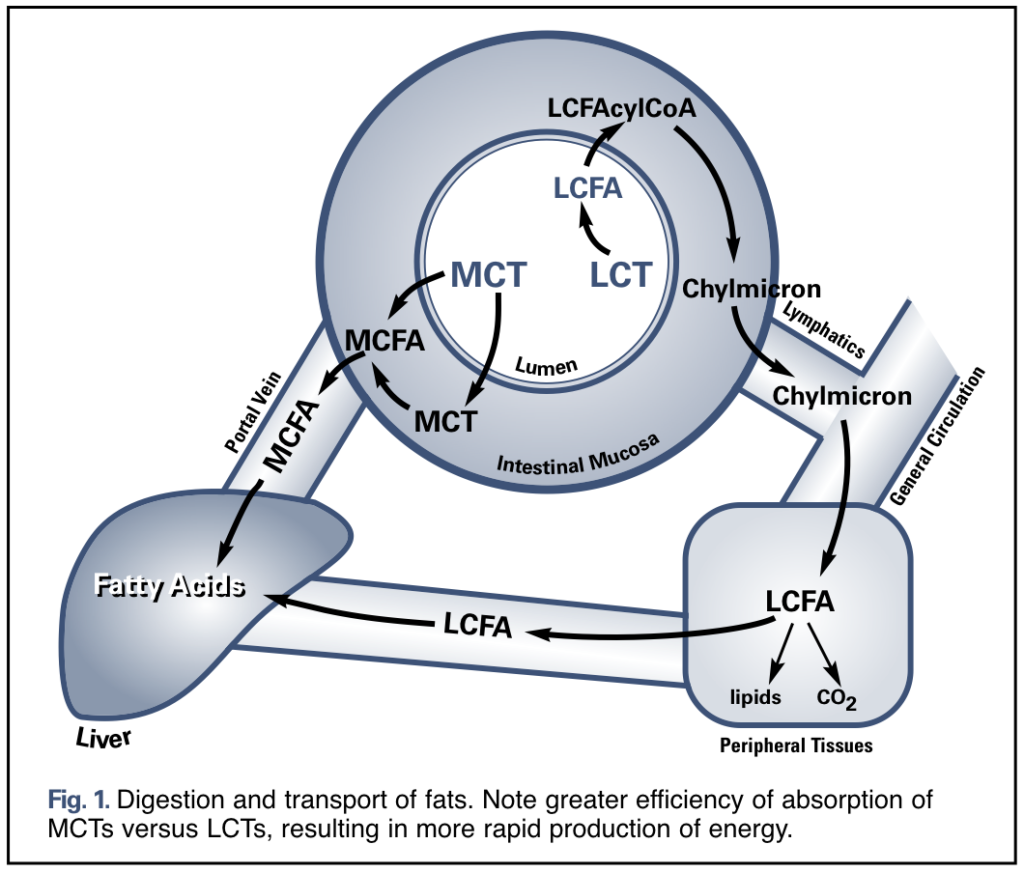
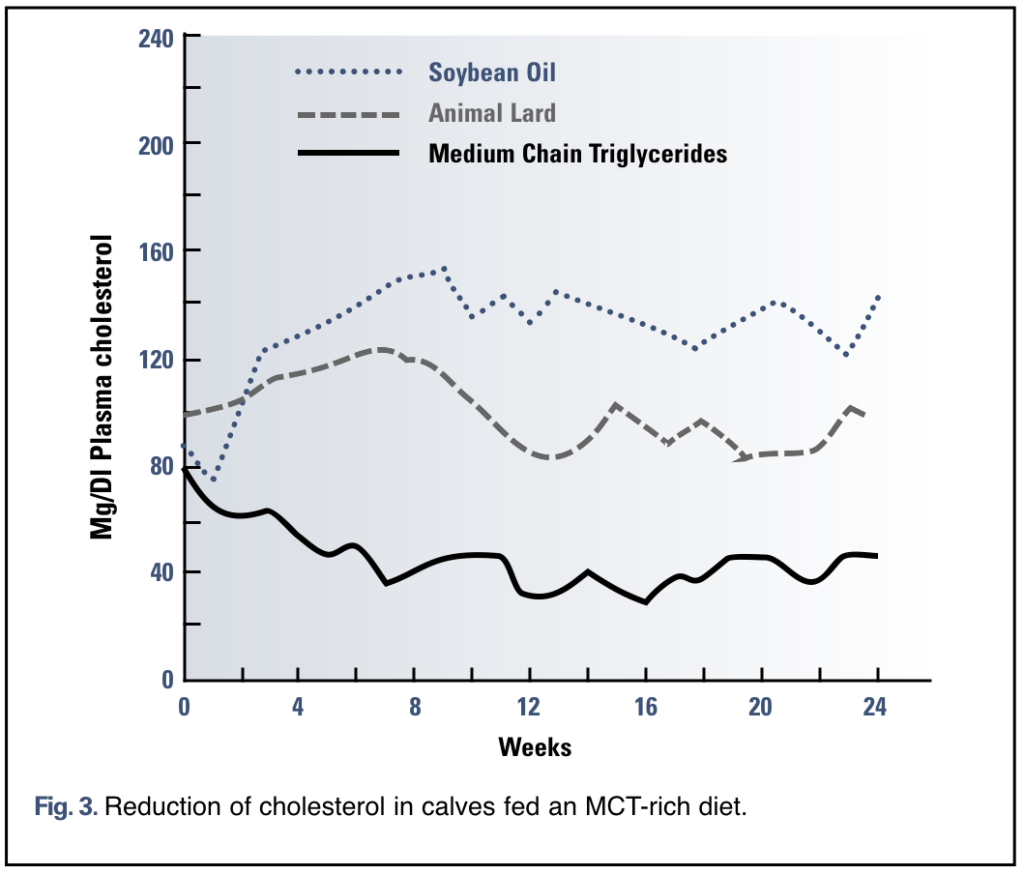
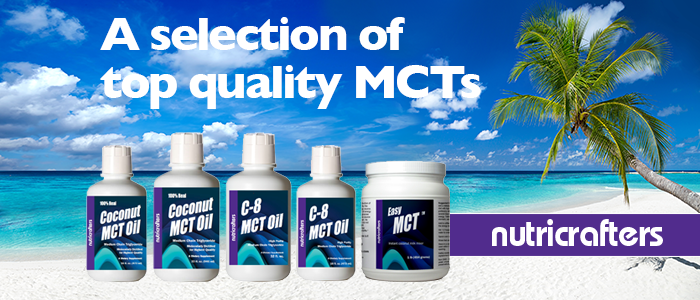




[…] https://nutritionreview.org/2013/04/medium-chain-triglycerides-mcts/ […]
[…] honestly didn’t mean to go on a rant! If you are interested in learning more about MCTs (medium chain triglycerides) and blood ketones and how this is beneficial to the human brain, you can start with those […]
[…] a unique form of dietary fat that impart a wide range of positive health benefits,” according to Nutrition Review. Compared to Long Chain Triglycerides, MCTs have 10 percent fewer calories, but provide more energy […]
[…] absorption of MCT oil helps to boost my immune function and reduce my cravings (hey!). It also helps athletes to improve performance and helps obese people to lose weight. Ah, the latest miracle supplement, […]
[…] Coconut oil is used a lot in vegan baking in place of butter and if you’re not already converted, it has great health benefits. The fats in coconut are medium chain fatty acids that metabolise differently to other kinds of fats – they don’t settle on the body as much as long chain fatty acids and can even enhance metabolism. […]
[…] healthy oils and vinegar to make her homemade mayonnaise. One she frequently has in the mix is this MCT oil, which is lower in calories, more quickly metabolized, and helpful with endurance (among other […]
[…] (4)Dean,W. English, J. 2013. Medium Chain Triglycerides (MCTs). Beneficial Effects on Energy, Atherosclerosis and Aging. Retrieved from: https://nutritionreview.org/2013/04/medium-chain-triglycerides-mcts/ […]
[…] weight loss compared with olive oil and can thus be successfully included in a weight-loss diet. Medium Chain Triglycerides (MCTs) Beneficial Effects on Energy, Atherosclerosis and Aging The role of oils containing triacylglycerols and medium-chain fatty acids in the dietary treatment […]
[…] hormones (from personal experience I’d say this is true). [If you're an über science nerd, this site really gets into the biological nitty gritty of MCTs]. We cook with coconut oil a lot, but on a […]
[…] health benefits of coconut oil have gained newfound attention as a result of the medium chain fatty acids it contains. These fatty acids help to speed up one’s metabolism, and for those who suffer […]
[…] parents use MCT oil to maintain brain health and I add in a splash of […]
[…] MTCs actually provide ten percent fewer calories than that of traditional Long-Chain Triglycerides (2), which you find in butters, lard, and most animal fats. I know what you’re saying, 10% is not […]
[…] These are some benefits of MCT’s […]
[…] weight loss compared with olive oil and can thus be successfully included in a weight-loss diet. Medium Chain Triglycerides (MCTs) Beneficial Effects on Energy, Atherosclerosis and Aging The role of oils containing triacylglycerols and medium-chain fatty acids in the dietary treatment […]
[…] properties 10. rich in vitamins b, c, calcium, zinc and copper to name a few source maca//source mct//source ginger//source […]
[…] 1. Coconut Oil This natural fat source is beneficial when in unrefined form. Look for the phrase “extra virgin” or “expeller pressed.” Expeller-pressed ensures no high-heat temperatures were used, which may damage certain oils. Great for cooking or adding to smoothies, coconut oil’s lauric acid content is what provides its performance-enhancing qualities. […]
[…] Medium Chain Triglycerides (MCTs) Beneficial Effects on Energy, Atherosclerosis and Aging. Nutrition… […]
[…] https://nutritionreview.org/2013/04/medium-chain-triglycerides-mcts/ […]
[…] Anders als langkettige Fettsäuren (LCTs), die erst in Chylmikrons (kleine Lipoproteipartikel) verpackt und über die Lymphbahnen transportiert werden und carnitin-abhngig verstoffwechselt werden müssen, nehmen mittelkettige Fette die Abkürzung direkt über die Leber, wo sie zur Ketogenese und Deckung des akuten Energiebedarfs rasch verstoffwechselt werden. (Bildquelle: Dean/English (2013)) […]
[…] healthy saturated fats. More specifically, they contain a fatty acid chain called “Medium Chain Triglycerides” or “MCTs.” These medium chain triglycerides are shown […]
[…] section of the store (or Amazon.com) and has the dual merits of extremely neutral flavor as well as superfood status, or: macadamia oil, grapeseed oil, canola oil. 1 tbsp white miso (optional) 1/2 lemon, or […]
[…] of the stuff can give you an energy boost—the body uses its medium-chain fatty acids as an energy source instead of storing it away. 49. Change up your baking game. The next time you’re channeling […]
[…] of the stuff can give you an energy boost—the body uses its medium-chain fatty acids as an energy source instead of storing it […]
[…] of the stuff can give you an energy boost—the body uses its medium-chain fatty acids as an energy source instead of storing it away. 49. Change up your baking game.The next time you’re channeling […]
[…] https://nutritionreview.org/2013/04/medium-chain-triglycerides-mcts/ […]
[…] jus buah, minyak kelapa mampu memberikan kamu tambahan energi. Minyak kelapa mengandung kandungan MCT, yang dapat memberimu tenaga lebih untuk menjalani […]
[…] in a few ice cubes if you want to capture that iced-blended coffee experience, and enjoy all those medium chain triglycerides. I’ve been drinking a cup of butter coffee before my runs and I definitely feel like […]
[…] as many carbon links as the Long Chain Triglycerides hiding in most processed foods, meaning that they’re more efficiently converted into energy. The rapid absorption makes them a popular choice among athletes to enhance endurance, performance, […]
[…] which are absorbed directly into the blood stream. That may sound like a bad thing, but MCTs are converted into energy faster and actually less likely to be stored as […]
[…] Nutrition Review: Medium Chain Triglycerides, Beneficial Effects on Energy, Atherosclerosis and Agin… […]
[…] and monounsaturated fatty acids. The saturated fatty acids are mostly medium chain-triglycerides (MCT) that assimilate quite well in our body’s system. Lauric-acid is the key contributor, which […]
[…] 2. MCT Oil (Medium Triglyceride Oil)- Think of it as coconut oil concentrate. The saturated fat boosts metabolism, increases the brain’s capacity to focus and even cures several health problems. Now, don’t get turned off by the words “oil” and “saturated fat”. The thing is Saturated Fat from Coconut Oil is very healthy and beneficial for the body. The body actually needs good fat (like the ones you get from eating avocados) in order to feel fuller, longer. MCTs are easily digested and metabolized by the body, unlike other forms of fat. The awesome thing about it is that this actually helps you burn body fat. Perfect for weight loss.Learn more about MCTs here. […]
[…] and chronic pain, improved metabolic functioning and increased neurogenesis) as well as the benefits of consuming MCT oils (such as increased energy, improved nutrition absorption and elevated mood levels), which means […]
[…] anyone who has increased energy needs, as following major surgery, during normal or stunted growth, to enhance athletic performance, and to counteract the decreased energy production that results from aging.” As an added bonus, […]
[…] https://nutritionreview.org/2013/04/medium-chain-triglycerides-mcts/ […]
[…] liver and more quickly metabolized so you get faster fuel. These fats aren’t turned into fat. Learn more about MCTs here. Lactose Intolerant? No Worries! Because ghee has been cooked down from butter, it no longer […]
[…] Kitchen’s premium coconut oil. Spray-dried to exact standards, it contains a high amount of Medium Chain Triglycerides which are crucial to a healthy […]
[…] Kitchen’s premium coconut oil. Spray-dried to exact standards, it contains a high amount of Medium Chain Triglycerides which are crucial to a healthy metabolism. Use it as a non-dairy substitute in place of a creamer […]
[…] Medium Chain Triglycerides (MCTs) […]
[…] oil get a bad wrap for, but coconut oil has these MCT’s – medium chain triglycerides!! If you care to read, it is quite fascinating how these buggers have positive impact on our weight control and immune […]
[…] have countless health benefits including immune support, weight control and even have been shown to help treat many serious diseases like cystic fibrosis and Crohn’s as well as aid in the recovery of severe injuries, burns and […]
[…] Medium-Chain Triglyceride- Scientific studies have found out that this ingredient, also known as MCT, can help burn excess calories in the body, thus leading to weight loss. It is also a natural appetite suppressant and energy booster. […]
[…] Good Fats Coconuts have gained superfood status mainly because of their medium chain triglyceride (MCT) content. MCTs are simply a type of fat. However, the body digests them differently than the more common long chain triglycerides (LCT) that most fatty foods contain. The metabolic pathways used to digest MCTs are much simpler than those necessary for the more comple… […]
[…] Good Fats Coconuts have gained superfood status mainly because of their medium chain triglyceride (MCT) content. MCTs are simply a type of fat. However, the body digests them differently than the more common long chain triglycerides (LCT) that most fatty foods contain. The metabolic pathways used to digest MCTs are much simpler than those necessary for the more comple… […]
[…] manufacturers/distributers should be of no exception. However, this information is not false. Clinical research does in fact support the claims made on the packaging. But mislabeling isn’t the issue […]
[…] manufacturers/distributers should be of no exception. However, this information is not false. Clinical research does in fact support the claims made on the packaging. But mislabeling isn’t the issue […]
[…] Dr. Ward Dean, M.D., has compiled an extensive listing of the health benefits associated with MCTs, which is available through Nutrition Review. […]
[…] Dr. Ward Dean, M.D., has compiled an extensive listing of the health benefits associated with MCTs, which is available through Nutrition Review. […]
[…] sweet stuff we can find. And why not? Cocoa contains many antioxidants and minerals, as well as the medium chain triglycerides (MCT) that most efficiently fuel our […]
[…] turds as I like to call them). These little guys are packed with monounsaturated fats (almonds) and MCT’s (coconut oil). Both of which help with weight control, provide a quick source of energy, and help […]